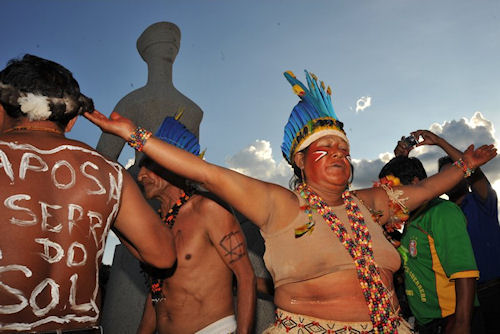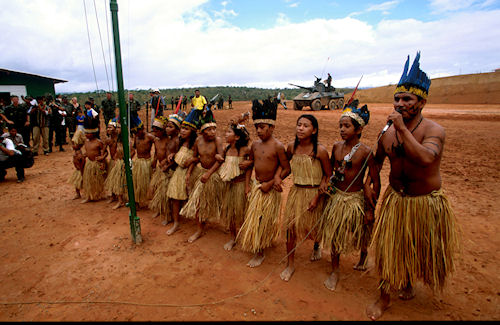 A state of lasting peace is making its way to the indigenous territory of Raposa-Serra do Sol in Northern Brazil, after years of bitter conflict between Indigenous People and non-indigenous rice farmers illegally occupying their territory.
A state of lasting peace is making its way to the indigenous territory of Raposa-Serra do Sol in Northern Brazil, after years of bitter conflict between Indigenous People and non-indigenous rice farmers illegally occupying their territory.
Survival International reports that the rice farmers are peacefully leaving the territory.
It’s a giant step forward from last year, when the same farmers went on a vicious rampage—attacking indigenous people, destroying bridges, setting up roadblocks, and even throwing bombs—in an effort to resist their lawful eviction, which was ordered by the president of Brazil when he recognized the territory in 2005.
Cruel and inhuman, it was enough for Brazil’s Supreme court to grant the farmers a temporary stay while it considered a petition from the Roraima state government, who sought to guarantee the farmers’ permanent stay in Raposa-Serra do Sol.
After months of anticipation, and even some fear at the prospect of what the farmers will do next, on March 19, 2009, the Supreme court reaffirmed Raposa-Serra do Sol ruling that the farmers must vacate the territory, which is home to some 20,000 Makuxi, Wapixana, Ingariko, Patamona, and Taurepang peoples.

Survival says Police are currently in Raposa to oversee the eviction process. They add that only “a few farming families remain” now, and they “have been given 10 more days to harvest their rice.”
Looking to the future, Dionito Jose da Silva, coordinator for the Indigenous Council of Roraima (CIR) states: “We are going to live how we are and not how others order us to.”
A Makuxi Chief adds, “Now we have the right to fish in our rivers once more without fear of being shot at by the farmers’ gunmen.”
It is indeed a good day for the Indigenous peoples of Raposa-Serra do Sol.

Indigenous Peoples are putting their bodies on the line and it's our responsibility to make sure you know why. That takes time, expertise and resources - and we're up against a constant tide of misinformation and distorted coverage. By supporting IC you're empowering the kind of journalism we need, at the moment we need it most.